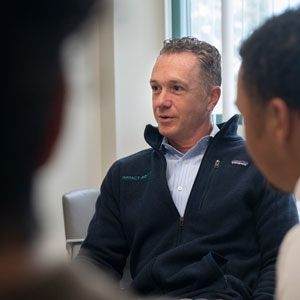Focused ultrasound could be key to treating Alzheimer’s disease, study finds
UCI expert calls results 'biologically exciting' but urges caution

comes to the blood-brain barrier. Credit: Steve
Zylius/UCI
IN THE NEWS: A small study has found that sound waves can safely be targeted at selected areas of the brain, opening a protective barrier to enable Alzheimer’s medications to be more effective.
 The study in the New England Journal of Medicine involved just three patients, but it heightens hope for the long-term success of the treatment strategy, known as focused ultrasound.
The study in the New England Journal of Medicine involved just three patients, but it heightens hope for the long-term success of the treatment strategy, known as focused ultrasound.
Joshua Grill, PhD, a professor of psychiatry and human behavior at UC Irvine and director of UCI Institute for Memory Impairments and Neurological Disorders (UCI MIND), calls the findings “biologically very exciting.”
Grill, who was not involved with the study, tells The Washington Post that the research may help scientists understand why some Alzheimer’s drugs work better than others. He added a note of caution, however:
“We have the blood-brain barrier for a really important reason, to protect the most important organ.”
Grill also stressed that approval of focused ultrasound treatment as an option for patients is years away for focused ultrasound treatment.
“We’re nowhere near there yet.”
Grill’s research has been funded by the National Institute on Aging, the National Institute of Neurological Disorders and Stroke, the Alzheimer’s Association, the BrightFocus Foundation, the Hartford Foundation, the American Federation for Aging Research, and the University of California.
He has received the National Alzheimer’s Coordinating Center Junior Investigator Award, the Alzheimer’s Association Turken Research Prize, the Community Spirit Award from OPICA Adult Day Services, and was named a P, Gene and Elaine Smith Term Chair in Alzheimer’s Disease Research.




